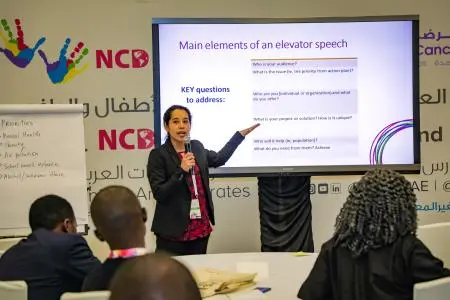PHOTO
Sharjah:
The second day of the Global Non-Communicable Diseases Forum on Child and Youth, on March 26, organised by Friends of Cancer Patients and NCD Child Alliance, saw experts converging, to develop an integrated approach to fight NCDs in children. This session focused on how to organise and effectively disseminate messages to community-based networks, benefit from WHO’s Knowledge Action Portal and influence policy makers.
In order to explore strategies to tackle the rising incidence of non-communicable diseases, as experienced by children and youth, Dr Mychelle Farmer Chair - NCD Child, imparted information about creating perfect NCD Childhood fact sheets at a workshop titled ‘Young Health Priorities, Interactive session III’. She said, “the purpose of these fact sheets is to provide our target audience with compelling information about Childhood NCDs in a clear and concise format without using complicated terminologies”.
Focusing on how complicated fact sheets defeat the purpose of conveying the message, often to people with non-medical backgrounds, good fact sheets on the contrary can be effective tools to advocate issues related to cancer, cardiovascular diseases, obesity, diabetes, substance abuse and asthma.
A second purpose that was up for discussion during workshop, saw pointers to a good elevator speech which is an outline for an idea or a project. Thus, experts concurred that NCD elevator speeches should foremost identify the decision maker in the given context, which is also critical in campaign planning.
Cristina Parsons Perez who is a Capacity Development Director, NCD Alliance says, “Advocacy campaigns are based around submissions and feedbacks, and the primary audience of decision makers are often at the helm of an advocacy effort. So, in cases where legislative heads are involved, it is crucial to understand their context and background. Also, NCD advocates should go to their target group with a clear mandate on who they are representing and what they want from them”.
Elucidating on issues related to NCD advocacy, global health coalition building and policy development, Diana Vaca McGhie, who is a Global Advocacy Manager, American Heart Association, US said, “the aim of this workshop is to share diverse experiences and lessons learned in promoting, prioritising and implementing wellness programmes. Private sector is a major potential partner in the national and global NCD response who can together adopt pro-health practices through good fact sheets and effective elevator speeches”.
These lectures were followed by interactive group activities where case studies were presented, and problem-solving messages were conveyed by team building efforts.
Other Workshops on Young Health Priorities:
On the sidelines, a workshop titled, “Young Health Priorities, interactive session I” was also held, that showcased examples of evidence-based, age appropriate NCD messages on mental health, obesity issues that begin at school and at home, cardio vascular diseases and diabetes. The group work entailed priority settings based on regional and national data. Comorbid conditions experienced by children and youth living with NCDs was also on the agenda.
The Global Non-Communicable Diseases Forum on Child and Youth also witnessed a second workshop called, “Young Health Priorities, interactive session II”, where participants discussed ways to use their stories for advocacy and empowerment. This also included pointers to group work with World Health Organisation (WHO) Knowledge Action Portal, to apply concepts for sharing stories through the KAP. These stories would often be informational, interactive and inspirational.
Thus, the takeaway from these sessions were that, pro-active corporations committed to creating effective strategies stand to gain tremendously in favour of NCD campaigns. These workshops therefore explored those realities, seeking to make concrete recommendations, around the best approaches to engage across various segments and involving the role of civil society in accelerating this multisectoral response to fighting Childhood NCDs.
Under the patronage of Her Highness Sheikha Jawaher Bint Mohammed Al Qasimi, International Ambassador of the World Cancer Declaration of the Union for International Cancer Control (UICC), International Ambassador for Childhood Cancer for UICC, and Patron of the Global NCD Alliance Forum, the Global Forum on Non-Communicable Diseases for Children is being organised by the Friends of Cancer Patients (FOCP) and is being held on 25th and 26th of March.
-Ends-
For any inquiry or for more information please do not hesitate to contact us on the below.
Dima Alastal
National Network Communications (NNC)
Mobile: 0566272174
© Press Release 2019Disclaimer: The contents of this press release was provided from an external third party provider. This website is not responsible for, and does not control, such external content. This content is provided on an “as is” and “as available” basis and has not been edited in any way. Neither this website nor our affiliates guarantee the accuracy of or endorse the views or opinions expressed in this press release.
The press release is provided for informational purposes only. The content does not provide tax, legal or investment advice or opinion regarding the suitability, value or profitability of any particular security, portfolio or investment strategy. Neither this website nor our affiliates shall be liable for any errors or inaccuracies in the content, or for any actions taken by you in reliance thereon. You expressly agree that your use of the information within this article is at your sole risk.
To the fullest extent permitted by applicable law, this website, its parent company, its subsidiaries, its affiliates and the respective shareholders, directors, officers, employees, agents, advertisers, content providers and licensors will not be liable (jointly or severally) to you for any direct, indirect, consequential, special, incidental, punitive or exemplary damages, including without limitation, lost profits, lost savings and lost revenues, whether in negligence, tort, contract or any other theory of liability, even if the parties have been advised of the possibility or could have foreseen any such damages.




















